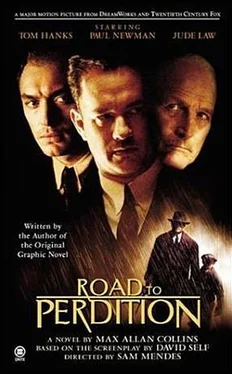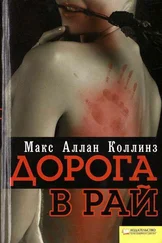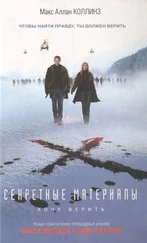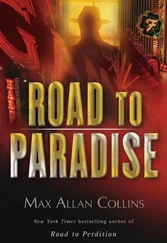Papa was saying, “All this money is much more than we need right now. Most of it will be yours one day.”
“Not just the two hundred dollars?”
“Not just the two hundred dollars.” He came over and sat next to Michael on the boy’s bed. “As we travel, I’ll deposit what we don’t need for expenses at more honest banks than the one we stopped at today.”
“That’s a good idea. We don’t have enough room in the compartment anymore.”
Papa touched Michael’s shoulder. “This money, when it’s yours, son... you must promise me you’ll put it to a good use.”
“What sort of use, Papa?”
“That’ll be your decision. You could go to school... college. You could buy a business. Perhaps a farm.”
“I wouldn’t want to be a farmer, Papa.”
“Be whatever you want, son... as long as it’s not like me.”
But as the boy lay in the darkness, waiting for sleep to come, he knew he did want to be like his father. Papa was a courageous soldier, and a resourceful one, too — hadn’t he found a way to take money from his enemies without firing a shot?
Maybe it was a sin to steal this money; the boy wasn’t sure — Papa had said it was like Robin Hood. And, anyway, he could go into a confessional, like Papa had, and be forgiven for his sins. After all, everybody was a sinner — the sisters at the Villa said so. But everybody could be forgiven, too — like soldiers who God forgave for the sins that war made them commit.
Seeing Papa talking to that pretty waitress had reminded the boy of his mother, but Michael would have thought about her, anyway, in his bed. He missed her so much, and every night he would think about her and the pain would be real, the emptiness awful; and he missed Peter, too — he’d give anything to be hit by just one more snowball by that little assassin...
Nonetheless — and despite what his father had said — Michael O’Sullivan, Jr., trying to sleep in the Muscatine motel, did not feel poor. Prosperity may not have been around the corner, but it sure was in the satchel between their beds, and in the backseat compartment of their Ford.
And never in his life had he felt closer to his father.
They were still a family, Papa and Michael.
Still a family.
A s the weeks rolled by, my father filled his black satchel at banks in Iowa and Illinois, Nebraska and Oklahoma, Missouri and Kansas, even Indiana and Wisconsin. Never was a shot fired, and our hold-ups became as close to routine as bank robbery could get .
Still, my father warned me: “Keep alert, son. Never forget what we’re doing and why we’re doing it... or who it is that’s pursuing us. Complacency kills as surely as a bullet.”
We did stop at other banks, as my father had indicated we would — not to rob them, but to place our excess cash into safety deposit boxes. As we traveled, Papa would read the papers religiously, looking for mention of our robberies, never finding anything, which pleased him .
He was less happy about the lack of other news. He never said, but upon reflection, I understand he was thumbing through the pages of papers looking for a mention of Connor Looney’s body turning up in a ditch somewhere, signaling Chicago’s surrender, and an end for our journey .
Sometimes at night, when my father grew sleepy behind the wheel, we would sleep in the car. I disliked this, and most of the time, he tried to find motels, or at least campsites where, when we parked, a few of the amenities of civilization were on hand .
And when we stopped to eat at a diner or cafe, he would call the farm at Perdition, at least once a day, talking to my aunt or uncle, who continued to report that crows were indeed on the fence. I was not aware of it at the time, but historians of the mob, including two Capone biographers, claim that among the phone calls my father made along the road were several that went directly to Frank Nitti .
At his desk, in a crisply knotted four-in-hand tie and his long-sleeved white shirt and dark suspenders, Nitti leaned over the phone, saying, “Mr. O’Sullivan — what can we do to put an end to this little misunderstanding?”
“Mr. Nitti, I have no misunderstanding with you,” O’Sullivan’s voice said, calm, reasonable over the crackling lone-distance wire. “I’ve no grievance against the Capone organization — I think I’ve made that clear from the start.”
“And I hope I’ve made it clear,” Nitti replied smoothly, “that the Looneys are business associates of ours, of long standing, and such alliances must be respected.”
“I still have friends back home, Mr. Nitti — and they tell me John Looney is a shambles. Not tending to business, his mind strictly on this present matter... and the welfare of his son.”
“You have a son, too, Mr. O’Sullivan. You can understand that view, certainly.”
“I hope that’s not a veiled threat, Mr. Nitti.”
Nitti, having just lighted up a cigarette, waved out the match. “Of course it isn’t. I merely—”
“I have a son, and if any harm comes to him, all of you best pray the breath has left me — because as long as I have one breath, all of you will pay.”
“Now who’s making threats, Mr. O’Sullivan?”
“I don’t threaten, I take action. Do you have a wife, Mr. Nitti?”
“I do.”
“A son?”
“Yes. And if that is—”
“No. I would never touch them. I would feed you your eyes, if necessary — but your family... no.”
Nitti blew out smoke. “Well, I do appreciate that. There are lines even men like us mustn’t cross.”
“Then you would you agree that some things in life are more important that money?”
“... I would.”
“Well, then I remind you: the murderer of my wife and son is in hiding, with your help.”
Nitti sighed, shifted in his swivel chair. “Mr. O’Sullivan, despite what you say, the Looney interests in the Tri-Cities continue to flourish. It would not be good business to—”
“Then I’m going to continue disrupting your business. Just keep a running tally and when it’s costing you more to be friends with the Looneys than not, make a business decision.”
“Back to threats, Mr. O’Sullivan?”
“Either turn Connor Looney over to me, or kill him yourselves in a way conspicuous enough to make the papers.”
And the line clicked dead.
Nitti looked across his desk at the well-dressed, moon-faced figure with the high forehead and parallel scars — a long and a short — on his plump left cheek, his forehead beaded with sweat; the man had been fighting a fever for several days.
“Find the prick,” Al Capone said, clenching a fist, “and kill him.”
“It’s not that easy, Al,” Nitti said, leaning back. “He stays on the move. And he knows just enough about our inside operations to really do us financial damage.
“Isn’t Ness and his goddamn metal-prow truck costin’ us enough these days! Legal fees up the ass... we’re drowning in negative fuckin’ cash flow.”
Nitti shrugged. “And when O’Sullivan finishes with banks, he can start knocking off casinos — or a brothel on a Saturday night. Where does it end?”
“Where the fuck does it end?” Capone lighted up one of his pool-cue Havanas, while Nitti fired up a fresh cigarette. “You suggestin’ we should do what he says? Give up Crazy Connor?”
Nitti was thinking.
Capone said, “The Looney interests in the Tri-Cities are still a goldmine, Frank — and the feds ain’t touching us there.”
“Fine, but if we gave Connor Looney to O’Sullivan, without making it look like we betrayed him, or his father, we could step in and take over those interests ourselves... with no cut going to the Looneys.”
Читать дальше












